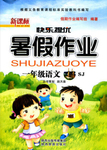题目内容
______ is generally accepted, economic growth is determined by the smooth development of production.
A. What B. That C. It D.As
练习册系列答案
 新课标快乐提优暑假作业陕西旅游出版社系列答案
新课标快乐提优暑假作业陕西旅游出版社系列答案
相关题目
题目内容
______ is generally accepted, economic growth is determined by the smooth development of production.
A. What B. That C. It D.As
 新课标快乐提优暑假作业陕西旅游出版社系列答案
新课标快乐提优暑假作业陕西旅游出版社系列答案